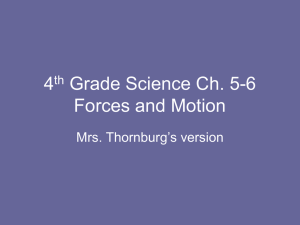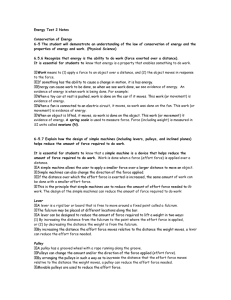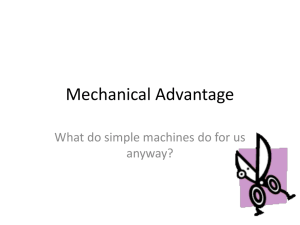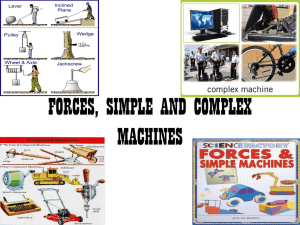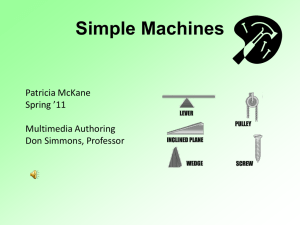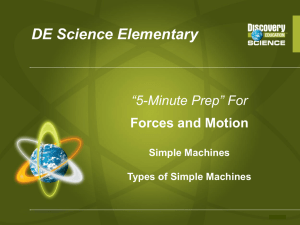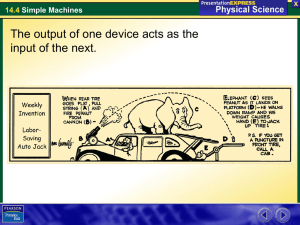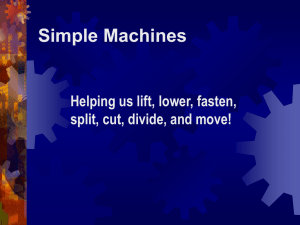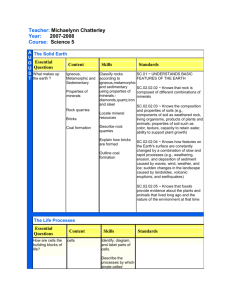Simple Machines: Levers, Pulleys, Inclined Planes & More
advertisement
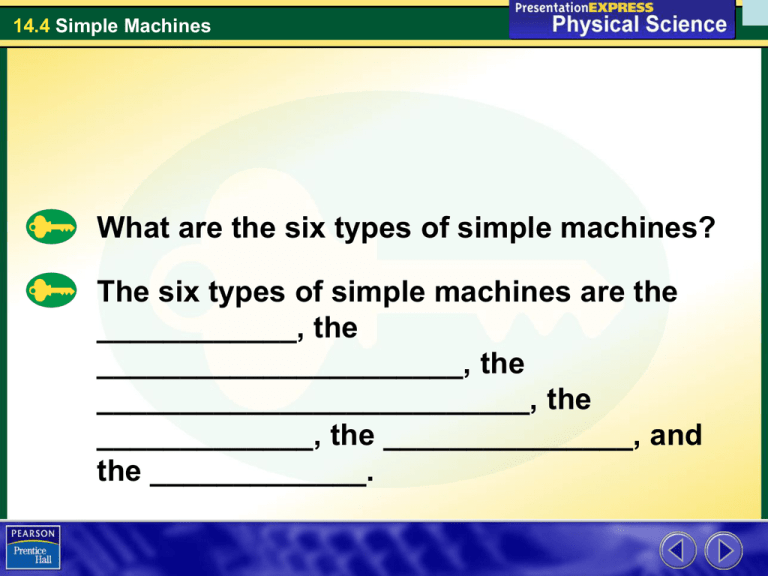
14.4 Simple Machines What are the six types of simple machines? The six types of simple machines are the ____________, the ______________________, the __________________________, the _____________, the _______________, and the _____________. 14.4 Simple Machines Levers What determines the mechanical ______________ of the six types of simple machines? To calculate the ideal mechanical advantage of any lever, divide the ___________ arm by the ___________ arm. 14.4 Simple Machines Levers A _____________ is a rigid bar that is free to move around a fixed point. The fixed point the bar rotates around is the _______________. 14.4 Simple Machines Levers The input arm of a lever is the distance between the input force and the fulcrum. The output arm is the distance between the output force and the fulcrum. Levers are classified into _____________ categories based on the locations of the input force, the output force, and the fulcrum. 14.4 Simple Machines Levers First-Class Levers The __________________ of a first-class lever is always located between the input force and the output force. Depending on the fulcrum position, the mechanical advantage can be greater than 1, equal to 1, or less than 1. 14.4 Simple Machines Levers The screwdriver is being used as a first-class lever with a mechanical advantage greater than 1. (Diagram is not drawn to scale.) 14.4 Simple Machines Levers Second-Class Levers • In a second-class lever, the ________________ is located between the input force and the fulcrum. • The input distance is larger than the output distance. • The mechanical advantage of a second-class lever is always greater than 1. 14.4 Simple Machines Levers The wheelbarrow has its output force located between the input force and the fulcrum. (Diagram is not drawn to scale.) 14.4 Simple Machines Levers Third-Class Levers • The _____________________ of a third-class lever is located between the fulcrum and the output force. • The output distance over which the third-class lever exerts its force is larger than the input distance. • The mechanical advantage of a third-class lever is always less than 1. 14.4 Simple Machines Levers The output distance of the broom is greater than the input distance the hands move through. (Diagram is not drawn to scale.) 14.4 Simple Machines Wheel and Axle To calculate the ideal mechanical advantage of the wheel and axle, divide the ___________ (or diameter) where the ___________ force is exerted by the radius (or diameter) where the ______________ force is exerted. 14.4 Simple Machines Wheel and Axle A wheel and axle is a simple machine that consists of two _____________ or cylinders, each one with a different radius. The outer disk is the wheel and the inner cylinder is the axle. The wheel and the axle rotate together as a unit. 14.4 Simple Machines Wheel and Axle A wheel and axle is a type of simple machine consisting of two disks or cylinders with different radii. Output Output Input Input Screwdriver shaft Steering shaft Steering wheel Screwdriver handle 14.4 Simple Machines Inclined Planes The ideal mechanical advantage of an inclined plane is the distance along the inclined plane divided by its change in height. 14.4 Simple Machines Inclined Planes An inclined plane is a ______________ surface along which a force moves an object to a different elevation. • The distance traveled is the input distance. • The change in height of the ramp is its output distance. • The mechanical advantage of an inclined plane is greater than 1. 14.4 Simple Machines Inclined Planes This long and winding road acts like an inclined plane. 14.4 Simple Machines Wedges and Screws A thin wedge of a given length has a greater ideal mechanical advantage than a thick wedge of the same length. Screws with threads that are closer together have a greater ideal mechanical advantage. 14.4 Simple Machines Wedges and Screws Wedges A _____________ is a V-shaped object whose sides are two inclined planes sloped toward each other. A wedge has a mechanical advantage greater than 1. 14.4 Simple Machines Wedges and Screws The wedge consists of two inclined planes that slope toward each other. The inclined planes force the wood fibers apart as the wedge is driven into the log. Input force 14.4 Simple Machines Wedges and Screws Screws A _________________ is an inclined plane wrapped around a cylinder. For two screws of the same length, the one whose threads are closer together moves forward less for each turn of the screw. A screw has a mechanical advantage greater than 1. 14.4 Simple Machines Wedges and Screws A screw is a simple machine made up of an inclined plane wrapped around a cylinder. 14.4 Simple Machines Pulleys The ideal mechanical advantage of a pulley or pulley system is equal to the number of ___________ sections supporting the load being lifted. 14.4 Simple Machines Pulleys A _______________ is a simple machine that consists of a rope that fits into a groove in a wheel. • Pulleys produce an output force that is different in size, direction, or both, from that of the input force. • The mechanical advantage of a pulley can be equal to or greater than 1. 14.4 Simple Machines Pulleys A fixed pulley changes only the direction of the input force. Fixed Pulley 4N 4N 4N 14.4 Simple Machines Pulleys Movable Pulley A _______________ pulley is attached to the object being moved rather than to a fixed location. • Both sections of the rope pull up with the same force. • The movable pulley has a mechanical advantage of 2. 14.4 Simple Machines Pulleys Movable pulleys change both the direction and the size of the input force. Movable Pulley 2N 2N 4N 14.4 Simple Machines Pulleys Pulley System A large mechanical advantage can be achieved by combining fixed and movable pulleys into a pulley system. • The mechanical advantage depends on how the pulleys are arranged. • The ideal mechanical advantage of a pulley system is equal to the number of rope sections supporting the load being lifted. 14.4 Simple Machines Pulleys Pulley systems are made up of both fixed and movable pulleys. Pulley System 1N 1N 1N 1N 1N 4N 14.4 Simple Machines Compound Machines • A ______________ machine is a combination of two or more simple machines that operate together. Most of the machines you use are compound machines. • The edges of a pair of scissors are sharpened like wedges. The blades and the handles together function as levers. • Cars, washing machines, and clocks are combinations of hundreds or thousands of simple machines. 14.4 Simple Machines Assessment Questions 1. A bar that is rotating about a fixed point is called a a. b. c. d. fulcrum. lever. wedge. compound machine. 14.4 Simple Machines Assessment Questions • A 3-meter-long ramp is used to lift a piano to a moving truck, which is 1 meter off the ground. What is the ideal mechanical advantage of the ramp? • • • • 1 2 3 33 14.4 Simple Machines Assessment Questions 1. A machine, such as a bicycle, that combines many simple machines is known as a complex machine. True False
